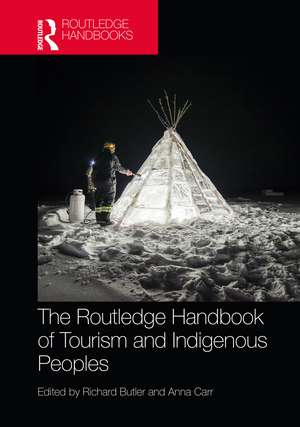The Routledge Handbook of Tourism and Indigenous Peoples
Editat de Richard Butler, Anna Carren Limba Engleză Hardback – 30 aug 2024
Offering socio-cultural perspectives and multidisciplinary insights from leading Indigenous and non-Indigenous scholars and tourism practitioners, the book explores contemporary issues, challenges and trends. Organised into six sections, the handbook explores Indigenous community involvement in tourism, Indigenous entrepreneurship and innovation, Indigenous tourism policies and politics, and the complexities of colonialism and decolonisation issues. This text focuses on the active role that Indigenous peoples have in the industry and uses international case studies and experiences to explore the global context of Indigenous tourism.
This handbook fills a notable gap by offering a critical and detailed understanding of the role of Indigenous practitioners and societies in tourism and how they interact within the tourism nexus. It will be of interest to scholars, students, tourism practitioners and policymakers working in tourism, development studies, anthropology, human geography and sociology.
Preț: 1563.30 lei
Preț vechi: 1906.46 lei
-18% Nou
Puncte Express: 2345
Preț estimativ în valută:
299.14€ • 312.96$ • 248.49£
299.14€ • 312.96$ • 248.49£
Carte tipărită la comandă
Livrare economică 02-16 aprilie
Preluare comenzi: 021 569.72.76
Specificații
ISBN-13: 9781032136547
ISBN-10: 1032136545
Pagini: 496
Ilustrații: 114
Dimensiuni: 174 x 246 mm
Greutate: 0.98 kg
Ediția:1
Editura: Taylor & Francis
Colecția Routledge
Locul publicării:Oxford, United Kingdom
ISBN-10: 1032136545
Pagini: 496
Ilustrații: 114
Dimensiuni: 174 x 246 mm
Greutate: 0.98 kg
Ediția:1
Editura: Taylor & Francis
Colecția Routledge
Locul publicării:Oxford, United Kingdom
Public țintă
Postgraduate and Undergraduate AdvancedCuprins
1. Introduction: Revisiting Tourism and Indigenous People. Section 1. Indigeneity. 2. “Are We Not All Indigenous?” Negotiating Indigenity in Greenlandic Tourism. 3. The Constant Creation of Aboriginality: A Commentary on Indigenous Being and Becoming. 4. A Critical Realist Appraisal of Indigeneity: The Case of Miao Peoples in a Tourism Village in China. 5. Power, Policies, and Cultural Sensitivity in Ainu Tourism: Indigenous Involvement in and Control over Tourism Developments in Hokkaido, Japan. Section 2. Indigenous. 6. Decolonising Indigenous Tourism: Reconciliation, Truth-Telling, Whiteness and “Welcome to Country” in Australia. 7. Learn, Teach, Heal: Indigenous Tourism as a Site for Reclaiming and Becoming. 8. “Come and Know a Little About Your Own Backyard”: Transformative Learning Potentials Through Knowledge Sharing in Indigenous Tourism in Australia. 9. Tourism, Truth-telling and Sovereignty: A Gitxaała Perspective. 10. You Can’t Ask That! Projective Techniques Unearth Socio-cultural Aversions Towards Indigenous Tourism. 11. An Indigenous Community Code of Conduct for Tourist Behaviours: Voices from the Tibet Autonomous Region, China. 12. Confronting Marginalisation? Gender Dynamics and Batwa Engagement with Tourism in Uganda. Section 3. Indigenous Alternatives. 13. Doing it the 'Pacific Way': Indigenous Education and Training in the Pacific Islands. 14. Stewarding Māori Taonga for Sustainable Indigenous Tourism Enterprise. 15. Indigenizing Tourism by Indigenizing the Landscape: A Digital Marketing Case Study of Wagiman Ethnobiology for Tourism and Conservation. 16. Conversations about Culture: The Need to Integrate Indigenous Voices into the Development of Sustainable Cultural Heritage Tourism Opportunities in the Pacific. 17. Tourism Enterprises in the South Pacific: Culturally Centered Adaptation in the Face of Covid-19. Section 4. Indigenous Knowledge and Rights. 18. The Integration of Indigenous Knowledge in Canadian Protected Areas to Foster Conservation, Reconciliation and Tourism Development. 19. Tourism Appropriation: ‘Taking’ Land and Culture in Sámi Areas. 20. An Evaluation of the New Ainu Law: Tourism Promotion Policy and Indigenous Rights of the Ainu People in Japan. 21. Indigenous Hosts and Food Security: A Case Study from Simien Mountains National Park. 22. Indigenous Knowledge as an Important Contribution to the Sustainability of Geotourism and Geoparks. 23 Reflexivity on the Establishment of National Parks in the Light of the Chapter by Mason et al. Section 5. Indigenous Tourism Innovations and Developments. 24. Social Innovation in an Indigenous Tourism Development. 26. Pathways To Culturally Sensitive Tourism Policies and Practices. 25. The Upper Navua Conservation Area: Reflections on Ecotourism and Community. 27. Indigenous Handicrafts Based Domestic Tourism in Bangladesh. 28. Indigenous Tourism in Iran. 29. Contemporary Arts and Indigenous Arts-Based Tourism in West Africa. 30. Don’t Worry. We Have Your Best Interests at Heart. Section 6. Indigenous Involvement in Planning Development. 31. Indigenous Tourism Association of Canada (ITAC). 32. Indigenous Tourism International Framework, Rights, and Empowerment of Grassroots Organizations: Latin America and the Chilean Case. 33. Development of the Inaugural Queensland First Nations Tourism Action Plan 2020-2025 and the Queensland First Nations Tourism Council. 34. Reflection on Aboriginal Tourism in Western Australia: A Balancing Act of Opportunity and Challenge. 35. Conclusions. Appendix.
Notă biografică
Richard Butler is Emeritus Professor of Tourism at Strathclyde University, Glasgow, Scotland. He has taught at the University of Western Ontario in London, Canada, at the universities of Surrey and Strathclyde in the UK and held visiting professorships in Australia, Austria, Italy, Hong Kong and the Netherlands.
Anna Carr (Ngāpuhi, Ngati Ruanui, Ngāruahine) is an Associate Professor, co-director of the Centre for Recreation Research and Head of Department at the Department of Tourism, University of Otago, New Zealand.
Anna Carr (Ngāpuhi, Ngati Ruanui, Ngāruahine) is an Associate Professor, co-director of the Centre for Recreation Research and Head of Department at the Department of Tourism, University of Otago, New Zealand.
Descriere
The Routledge Handbook of Tourism and Indigenous Peoples presents an up-to-date, critical and comprehensive overview of established and emerging themes around Indigeneity and connections between Indigenous peoples and tourism development.
